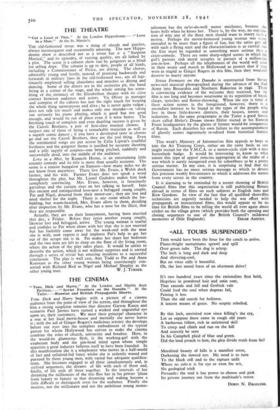THE CINEMA
" Tom, Dick and Harry." At the London and Marble Arch Pavilions.—" Soviet Frontiers on the Danube." At the Tatler.—Russian and British Propaganda Shorts.
Tom, Dick and Harry begins with a picture of a cinema audience from the point of view of the screen, and throughout the film a strong suspicion remains that director Garson Kanin and scenarist Paul Jarrico have turned a wicked and ungrateful eye upon us, their customers. We meet their principal character in a seat at her local movie-house and mentally she never leaves it ; with the aid of Ginger Rogers's malicious artistry she develops before our eyes into the complete embodiment of the typical patron for whom Hollywood has striven to make the cinema combine the roles of church, university and boudoir. Here, in the would-be glamorous flesh, is the working-girl with the exuberant body and the pin-head mind upon whose simple appetites a great industry believes itself to have been founded. In this manifestation she is a telephonist who moves in a half-world of fact and celluloid-fed fancy whilst she is ardently wooed and pursued by three young men, with varied but adequate qualifica- tions. She becomes engaged to all three simultaneously and, in stylised sequences, she dreams of life with each of them and, finally, of life with all three together. In the intervals of her dreaming the millionaire of the trio ffies her in his private 'plane from luxury to luxury so that dreaming and waking become a little difficult to distinguish even for the audience. Finally she marries, not the millionaire and not the ambitious young motor- salesman but the ne'er-do-well motor mechanic, because she hears bells when he kisses her. There is, by the way, no explana- tion of why any of the three men should want to marry such a moron. Perhaps the movie-bemused young woman was never intended to be more than a figure of fun, but the satire gets off with such a flying start and the characterisation is so careful that the film must be regarded as something more serious than a crazy-comedy. There are some sharp-edged scenes in which the girl's parents sink moral scruples in pursuit of a millionaire son-in-law. Perhaps all the telephonists of the world will arise in their wrath and march to Hollywood to protest that if they were as stupid as Ginger Rogers in this film, then they wouldn't deserve to marry anyone.
Soviet Frontiers on the Danube is constructed from Soviet news-reel material photographed during the advance of the Red Army into Bessarabia and Northern Bukovina in 1940. There is convincing evidence of the welcome they received, but the film is too long and becomes wearisome in its repetition of hand- clasps, speeches and flower-throwing. When the eye is tired of these action scenes in the foreground, however, there is a secondary interest to be found in the types of the people who live in these little-known districts, their houses, streets and industries. In the same programpie at the Tatler a good Soviet short called Hitler's Dream shows Hitler visited in his Eastern Front headquarters by the ghosts of former would-be conquerors of Russia. Each describes his own failure to the accompaniment of ghostly scenes ingeniously re-edited from historical feature films.
This week's Ministry of Information film appeals to boys to join the Air Training Corps, rather on the same basis as one might recruit for the Y.M.C.A. or a motor-cycle club with a nice buttonhole badge. It would be interesting to, know to what extent this type of appeal remains appropriate in the midst of a war which is surely recognised even by schoolboys to be a pretty serious matter. In any case, it is surprising to find that the Government has no more serious message to which to devote this precious weekly five-minutes in which it addresses the nation from every screen in the country.
It is alarming to be reminded by a recent showing of British Council films that this organisation is still publicising Britain abroad in terms of films on such subjects as English inns and Kew Gardens. In view of the fact that all qualified short-film technicians are urgently needed to help the war effort with propaganda or instructional films, this would appear to be no time for British films to be telling the world all over again about cricket on the village green (which provides• both the opening and closing sequences to one of the British Council's mildewed


























 Previous page
Previous page